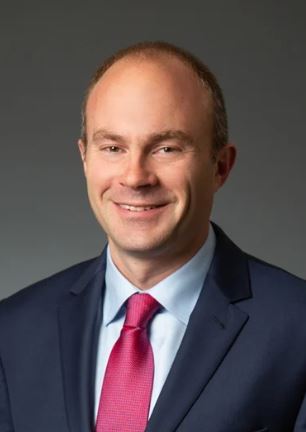The pandemic has exposed how important in-person connection is at work and to work teams. As the legal profession reimagines the structure of work post-pandemic, the lessons you’ll learn below about support, caring, and showing up for each other must be considered.
Great leaders support the people with whom they work, and this was made crystal clear in my interview with former Army Captain William Curtin. Bill is now a restructuring attorney at Sidley Austin LLP and has had a remarkable career in the Army, the Department of Justice, and private practice. Bill grew up in Suffern, New York, not far from West Point. He comes from a military family and knew early on that the military would be part of his career path. He was accepted at West Point, but he decided not to go in favor of wanting to have a more traditional college experience. As the first person in his family to attend college, he remembers how scared he was to tell his dad that he had changed his mind. When he did, his dad asked, “Are you sure?” Bill replied, “Yes,” and his dad never mentioned it again. Bill was deeply moved by the show of support, and it was an important demonstration of trust, respect, and good leadership.
“Life hinges on a couple of seconds you never see coming.”
After attending Providence College on an ROTC scholarship, Bill went to law school, was accepted into the Army JAG Corps in January 2003 and deployed to Iraq in November 2004. He worked for the United States Army Trial Defense Service, which provided all of the criminal defense services to Army personnel. Bill was one of 12 lawyers deployed to Iraq during this time, and while he traveled around the country to do his work, he was based in Mosul at Forward Operating Base Marez.
On December 21, 2004, only a matter of weeks into his deployment, he was finishing lunch in the dining facility, when suddenly, there was an explosion and he was thrown several feet from his chair. He wasn’t wearing his helmet or protective gear, a common practice among soldiers when eating. He and his paralegal ran outside toward a concrete shelter to take cover, thinking that the area had been hit by a rocket or mortar. At first, Bill did not realize he was injured; in fact, after an hour of assisting with the injured, he walked back to his office before he realized something was wrong. While his injuries weren’t life-threatening, he needed medical attention.
Several days later, Bill learned what had happened. A suicide bomber detonated a bomb inside the dining facility, killing 22 people and injuring 72, including Bill. The investigator told him that the suicide vest that was used was designed to propel shrapnel 180 degrees, not 360 degrees. Bill was hit by ricochet and not more seriously injured or killed because he was on the better half of the circle based on the direction the suicide bomber was standing. Bill was awarded a Purple Heart while still in Iraq and a Bronze Star post deployment.
Lessons in exceptional leadership from the Army
Bill shared with me the following amazing stories of exceptional leadership, all of which demonstrate the impact of taking care of people, from his time in the military:
- Lt. Col. Fred Taylor was in charge of all of the defense attorneys in Iraq for the majority of the time Bill was there. He was based in Baghdad. Anytime someone new came into country, he would fly to Kuwait and meet them, fly with them to wherever they were going and stay for a couple of days. When Bill was injured, Lt. Col. Taylor was there shortly after.
- When Bill was awarded his Bronze Star, Col. Clyde Tate (later Gen. Tate), the highest-ranking deployed JAG during Bill’s time in Iraq, traveled to Ft. Leavenworth to award Bill his Bronze Star. Bill’s family attended the ceremony, and Gen. Tate spent over an hour with them.
- During one particularly difficult and contentious case in the U.S., Bill’s boss at the time, Lt. Col. John Carroll, traveled from Ft. Leavenworth to Ft. Campbell solely as a show of support. Bill and his co-counsel were put in a difficult position, yet Lt. Col. Carroll gave them everything they needed to succeed, including being physically present.
- Lt. Col. Len DePasquale was assigned as co-counsel with Bill on a high-profile case in Iraq. Lt. Col. DePasquale was a reservist at the time, and his civilian job was a bankruptcy lawyer at the Department of Justice. Post-deployment, Lt. Col. DePasquale suggested bankruptcy law as a next step in Bill’s career and began mentoring him. He sent Bill bankruptcy books and had many hours long phone calls with him to teach him the law in this area and provide guidance.
Lessons for leaders in law
According to Bill, “Leadership means striking a balance between achieving the mission while also taking care of your people. And the right ratio is not 80/20 mission to taking care of people; it has to be much closer to even. You’ll succeed more if you keep some larger percentage of your focus on taking care of your people. They will work harder for you and achieve more when you do.”
While this may sound intuitive, I asked him why it was so hard to do in the legal profession. He said that there are many factors. First, it’s more of a challenge in some places than others. Second, the nature of the job is such that clients have complex work with very specific expectations. It’s a service industry and lawyers need to accommodate. Third, there is also a lack of training and focus on management in the legal profession, which is the opposite of the military. Leadership training can be easier to implement and require in the military because even though you’re still serving a “client,” you don’t have the huge added pressure of making money and retaining clients.
The cultural shift needed in law is hard. One answer could be giving associates, counsel, and partners billable hours credit for time devoted to leadership and management training. Treating leadership and management as an on-going skill set to be developed would also help. Bill appreciates his group at Sidley because they consistently work collaboratively as a team. When Bill decided to leave the Department of Justice, he chose Sidley based on its reputation for having good leadership and good people to work with. He has found this to be true.
“Rarely, if ever, are any of us healed in isolation. Healing is an act of communion.”
It’s not always easy to share difficult stories, yet stories can be a source of inspiration, healing, and strength. When Bill first publicly shared the story about his experience in Iraq, there were many reactions, but one stood out. Sergeant Major Gary Fortunato, who Bill met as a sophomore in the ROTC program at Providence, told him, “We never forget regardless of the years that pass. But what helps is sharing the story so that you gain strength from all of us. Be at Peace for life has many doors still to open for you.” It could not have been clearer how much he cared.
Leaders in law have a unique opportunity in the coming months to help their people re-group after a once-in-a-generation, life changing event. What stories will be shared about how you lead?
Please click here to order my new book, Beating Burnout at Work: Why Teams Hold the Secret to Well-Being and Resilience.
For more in this series, please read Leadership Lessons from an Air Force JAG, Leadership Lessons From A Former Armor & Cavalry Officer, and Leadership Lessons From A Former F/A-18 Weapons System Officer







